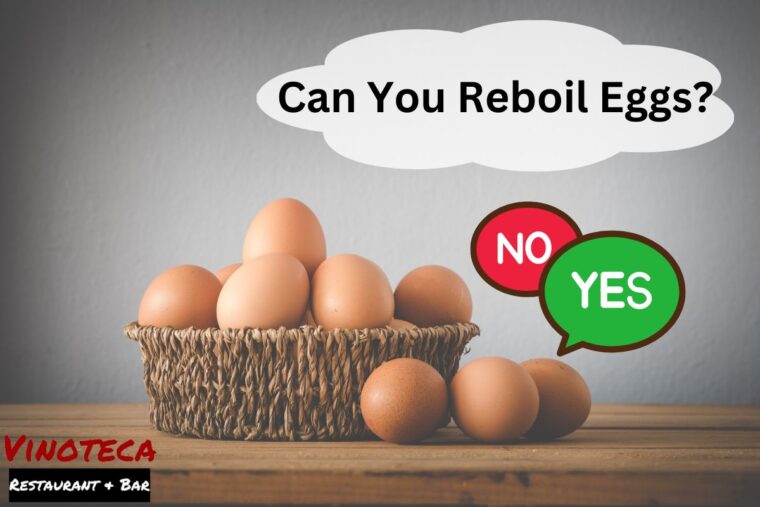It’s a controversy that’s lasted for years: Can you reboil eggs? It’s often been said that reheating eggs is dangerous and can even lead to food poisoning, causing many people to be hesitant when it comes to trying this age-old kitchen dilemma.
But according to expert opinions from nutritionists, the truth behind reheating eggs has recently come out – and put an end on this long-debated topic once and for all!
In today’ s blog post, we’ll discuss what happens when you do reboil those leftover hard boiled eggs in your refrigerator (spoiler alert: there might not need any worrying at all!).
So if you’re curious about the science behind egg boiling or just want some insight into how best to use up remaining cooked eggs in your kitchen, read on!
Can You Reboil Eggs?
You maybe wonder that Can you reboil eggs?, and…
Here’s the answer you’ve been waiting for: Yes, it is safe to reboil eggs. When done right, reheating a hard-boiled egg can actually make it safer and tastier than before – as long as you do it correctly and take the necessary precautions to avoid any foodborne illnesses.
While there are some fundamental differences between boiling and reheating an egg that can affect its quality and taste, when done properly, reheating cooked eggs should not be a cause for concern.
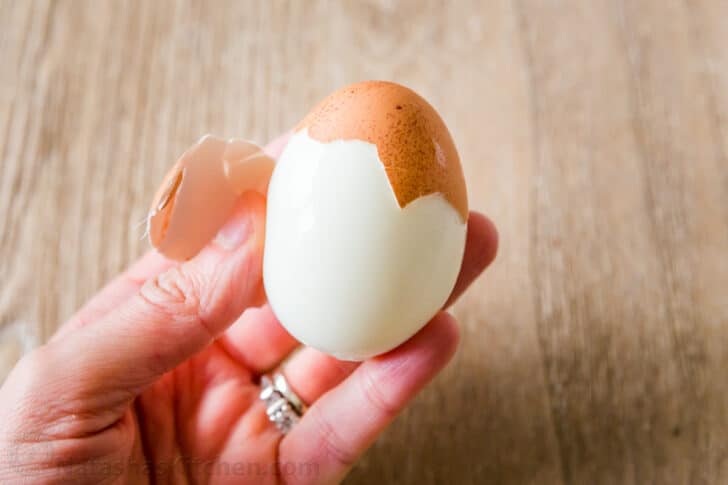
🔸 When reboiling an egg, it’s important to note that the water used must reach at least 212°F (100°C). This temperature ensures that all potential bacteria or germs are killed and eliminated during the reheating process.
Lower temperatures may not be hot enough to kill all of these pesky microorganisms, leading to a greater risk of food poisoning.
🔸 When reboiling an egg, it’s also important to ensure that the liquid used is fresh and clean.
Reusing old boiling water has been known to cause contamination of eggs due to potential pathogens that can grow in standing water over time. To avoid this issue, make sure you use clean water and boil from cold each time before serving your eggs.
🔸 Finally, if you’re looking for the healthiest way possible to consume cooked eggs again – consider poaching them!
Poaching gently heats up already cooked eggs (usually at about 160°F or 70°C) by immersing them in a pot of boiling water and letting the egg cook in its own shell.
Unlike boiling, poaching does not require eggs to be fully submerged for any period of time, making this method the ideal way to reheat leftover cooked eggs and preserve their texture and flavor!
So there you have it – can you reboil eggs? Absolutely! As long as you follow proper safety precautions like using clean, fresh water at the appropriate temperature, there shouldn’t be any issue with reheating those old hard boiled eggs.
So go ahead and give your food another chance – happy cooking!!
More Related Topic You Should Read
- Can You Microwave Sour Cream? Discover the Surprising Truth!
- Can You Microwave Alcohol? Find Out the Truth Here!
- Breaking News: Can You Microwave Mayo? Discover the Surprising Truth Now!
- Can You Reheat Mussels? YES, Here’s The Best Way
- Can You Defrost Salmon In The Microwave? YES! Follow These Steps
Things To Know Before Re-boiling Eggs
The short answer to whether or not you can reboil eggs is yes, you can. However, there are a few things you should take into consideration before doing so.
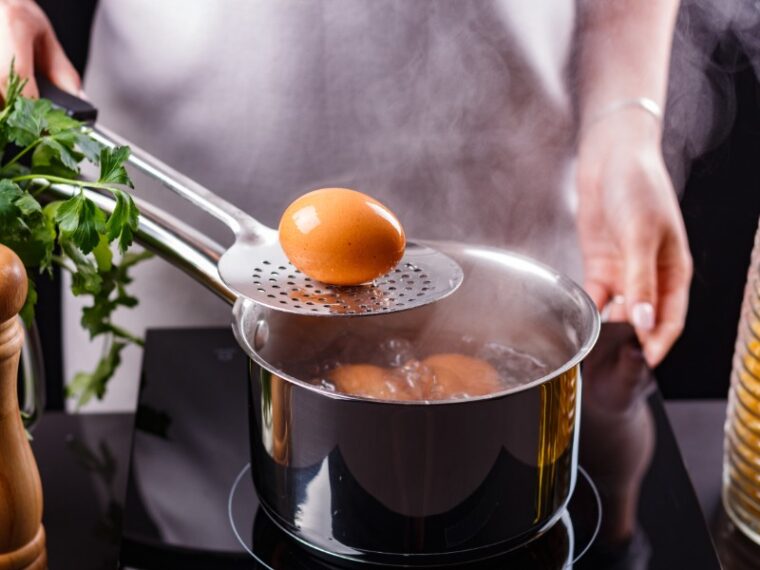
🔸 When you boil an egg, you denature the proteins in the egg white and yolk, which causes them to solidify. If you reboil an egg, you are essentially denaturing the proteins a second time, which can cause the texture of the egg to become rubbery and tough.
When you boil an egg for the second time, the heat causes the proteins in the egg to become tougher and rubbery, making the egg less palatable.
🔸 Additionally, if you keep boiling the egg, the moisture inside the egg will eventually evaporate, leaving you with a dry, overcooked egg.
🔸 Another thing to consider is that if you are planning on reboiling eggs, you should make sure that they have been properly stored in the refrigerator.
Bacteria can grow on boiled eggs left at room temperature, which can lead to food poisoning if consumed.
If you are unsure whether or not your boiled eggs have been stored properly, it is best to err on the side of caution and avoid reboiling them.
If you do decide to reboil your eggs, there are a few things you can do to help maintain their texture and flavor.
- First, make sure to only reboil the eggs once. If you continue to boil them multiple times, the texture will become increasingly rubbery.
- Additionally, you can try adding a splash of vinegar to the water when boiling the eggs. This can help prevent the egg white from becoming rubbery and tough.
If you do decide to reboil your eggs, there are a few things you can do to ensure they turn out as best as possible.
- Firstly, make sure you only reboil the egg once. If you keep boiling the egg, it will become tougher and less flavorful.
- Secondly, don’t leave the egg in the water for too long. Boil the egg for a maximum of 10 minutes, then remove it from the water and allow it to cool down.
- Finally, after you’ve boiled the egg for the second time, you can try adding some seasoning to improve the flavor.
However, even with these tips, reboiling eggs is not recommended. Instead, there are other ways you can use up your leftover eggs.

- You can make a sandwich or salad with boiled eggs, or use them to make egg salad or deviled eggs.
- You can also try pickling your eggs, which involves boiling them in vinegar and spices to create a tangy, flavorful snack.
While you can technically reboil eggs, it’s not recommended due to the tough, rubbery texture that results from the second boiling. Instead, try using your leftover eggs in other ways, such as in salads, sandwiches, or even pickled for a tasty snack.
How to Reboil an Egg
How to Reboil Eggs on the Stove
If you find yourself in the situation where you need to reboil an egg, here are a few tips that can help ensure your eggs turn out as best as possible:
1️⃣ Start by bringing a pot of water to a full boil. Make sure to add enough water so that the eggs will be fully submerged.
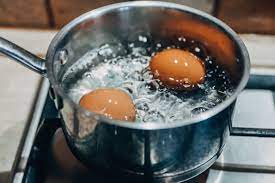
2️⃣ Once the water is boiling, carefully lower the eggs into the pot using a slotted spoon or wire basket. Boil the eggs for no more than 10 minutes before removing them with a slotted spoon or tongs and allowing them to cool down.
3️⃣ When you remove the egg from the pot, run it under cold water for 30 seconds to stop it from cooking further.
4️⃣ Shell the egg and discard the shells, then season with salt and pepper to taste before serving.
5️⃣ To help prevent the eggs from becoming rubbery or tough, you can add a splash of vinegar to the boiling water before adding the eggs. This will help keep some of the proteins in the egg intact as they cook.
Keep in mind that even if you follow these tips, reboiling an egg may not produce desirable results due to its already-cooked state. If possible, it’s best to avoid reboiling your eggs and instead use them in other dishes such as salads or sandwiches.
How to Reboil Eggs in a Bowl of Hot Water
If you don’t have access to a stove, or simply want an easier way to reboil eggs, here is how you can do it in a bowl of hot water:
1️⃣ Start by filling a large bowl with very hot tap water (about 140°F).
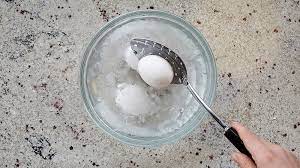
2️⃣ Place the eggs in the bowl and let them sit for 4-5 minutes. Make sure to use enough water that the eggs are fully submerged.
3️⃣ After 4-5 minutes, remove the eggs from the hot water and run them under cold water for 30 seconds before shelling them and discarding the shells.
4️⃣ Season with salt and pepper as desired before serving.
If you’re reboiling eggs in a bowl of hot water, make sure to not leave them in the water for longer than 5-7 minutes. Leaving them in too long can cause the egg whites to become rubbery and tough.
Additionally, adding a splash of vinegar to the hot water can help prevent the proteins from becoming overly toughened during this process.
Overall, reboiling eggs may not produce desirable results due to their already cooked state. If possible, it’s best to avoid reboiling your eggs and instead use them in other dishes such as salads or sandwiches.
But if you must reboil an egg, following these tips will help ensure that your reboiled egg is as good as possible.
Moreover, it’s best to avoid microwaving your eggs when attempting to reboil them. Microwaves cause uneven heat distribution, which could end up cooking your eggs unevenly and compromising their safety.
To sum it up:
Yes, you can reboil eggs – but only once! As long as you follow the steps outlined above and keep all other safety precautions in mind (such as refrigerating your eggs properly), there’s no need to worry about any health risks associated with reheating them.
So go ahead and enjoy your freshly-boiled snacks without guilt! Enjoy!
How To Tell If An Egg Is Safe To Reboil

✔️ Before you attempt to reboil an egg, make sure to read the expiration date on its label. If the eggs are past their sell-by date, they should not be reboiled as this could lead to foodborne illness.
✔️ If the eggs are within their expiration date and appear safe for consumption, it’s important to check them for any cracks or openings in the shells before boiling them again.
A cracked egg will allow bacteria to enter and contaminate its contents, so it’s important to discard such eggs immediately.
✔️ Once you’ve determined that your eggs are safe for reheating, double-check them by smelling them.
Spoiled eggs typically have a strong sulfuric smell that can easily be detected upon opening them. If your eggs smell off, it’s best to discard them and start fresh with a new batch.
If your eggs pass the tests mentioned above, you can then proceed with reboiling them. Just make sure to follow the steps outlined in this article to ensure that they come out as safe and tasty as possible! Good luck!
What Is The Safety Risk Of Reboiling Eggs
Firstly, let’s explore why some people believe that reboiling eggs is unsafe.

The concern is that when you boil an egg, the heat causes a chemical reaction to occur that produces hydrogen sulfide gas. This gas can cause the egg to have a foul smell and taste, and it can also be toxic in high concentrations.
Some people believe that if you reboil an egg, the concentration of hydrogen sulfide gas will increase and become dangerous.
However, the truth is that reboiling an egg is not necessarily unsafe. While it is true that hydrogen sulfide gas can be produced when boiling an egg, the amount produced is generally not dangerous.
In fact, the amount of hydrogen sulfide gas produced during the boiling process is not significant enough to cause any harm to humans.
So, why does an egg sometimes smell bad after boiling? The answer lies in the age of the egg. As an egg ages, the white becomes more alkaline, and the yolk becomes more acidic.
This change in pH can cause the egg to smell bad when boiled, especially if it is overcooked. Reboiling an egg that has already been boiled may cause it to become overcooked, which can result in a foul smell and taste.
Another factor to consider is the risk of bacterial contamination. When you boil an egg, any bacteria that may be present on the shell or inside the egg are killed.
However, if you store boiled eggs at room temperature for an extended period of time, bacteria can grow and multiply, causing the egg to become unsafe to eat.
Therefore, it is important to refrigerate boiled eggs and consume them within a few days.
To avoid these risks, it is essential to follow proper food safety guidelines when preparing and reheating eggs. Here are some tips to keep in mind:
1. Store hard-boiled eggs in the refrigerator: If you have leftover hard-boiled eggs, store them in the refrigerator within two hours of cooking.
2. Reheat eggs properly: When reheating eggs, be sure to heat them to an internal temperature of 165°F to kill any bacteria.
3. Use eggs within a week: Hard-boiled eggs should be consumed within a week of cooking to prevent bacterial growth.
4. Discard cracked eggs: If an egg is cracked or damaged, discard it immediately.
In conclusion, the safety risk of reboiling eggs is minimal. While it is true that hydrogen sulfide gas can be produced during the boiling process, the amount produced is not dangerous.
As with any food, it is essential to follow proper food safety practices to ensure that you are consuming safe and healthy food.
FAQs on Can You Reboil Eggs
Can boiled eggs be heated again?
Yes, boiled eggs can be heated again as long as they have been stored properly and are reheated to an internal temperature of 165°F.
Are hard-boiled eggs safe to eat after a week?

No, hard-boiled eggs should not be consumed after a week of cooking because bacteria can grow on them and make them unsafe to eat.
Can you eat an egg that’s not fully boiled?
No, it is not safe to eat an egg that has not been fully boiled. Partially cooked eggs can contain bacteria and should be thrown away.
Can I reboil cracked eggs?

No, cracked eggs should not be reboiled as they are more likely to become contaminated with bacteria. Discard any cracked eggs that you come across.
What happens if you hard boil an egg twice?
Reboiling an egg twice is not necessarily unsafe. However, the egg may become overcooked and develop a foul smell and taste. It is best to avoid reboiling eggs multiple times.
Can you tell if an egg has gone bad?

Yes, there are several signs that can indicate whether or not an egg has gone bad. If the eggshell appears cracked or damaged, if it smells off, or if it has unusual coloring when cracked open, the egg should be discarded immediately.
Final Thoughts
When it comes down to it, the answer is clear: Yes, you can reboil eggs safely – as long as you do so within a week of boiling them initially.
To be extra cautious, make sure that the eggs have been stored properly and reheat them to an internal temperature of 165°F. Otherwise, it is best to discard any cracked or damaged eggs that you may come across. Such measures can help prevent bacterial contamination and ensure the safety of your meal!
Egg-lovers rejoice-you can safely reboil eggs if you adhere to all safety precautions. Store and reheat your eggs properly, discard any cracked or damaged eggs, and enjoy your meal!
Thanks for reading! We hope you found our article helpful in understanding about can you reboil eggs. To stay safe and healthy when cooking, always remember to follow proper food safety guidelines. Good luck and happy boiling! 🙂

